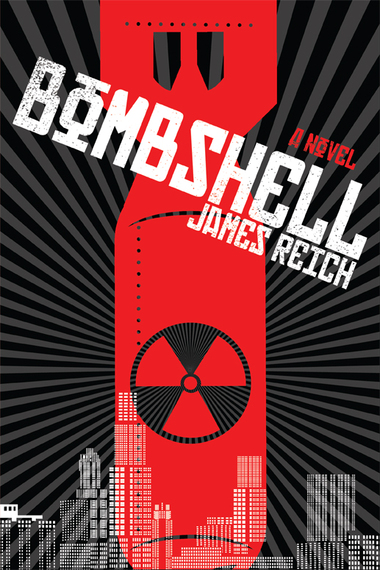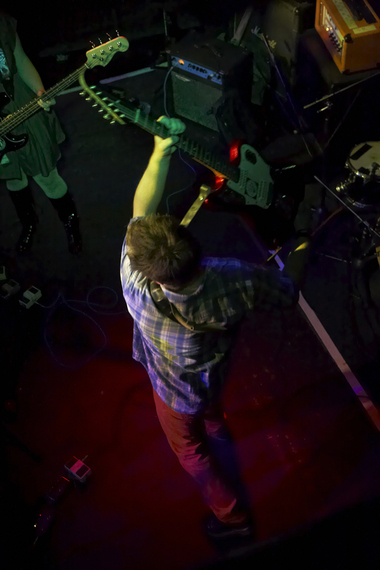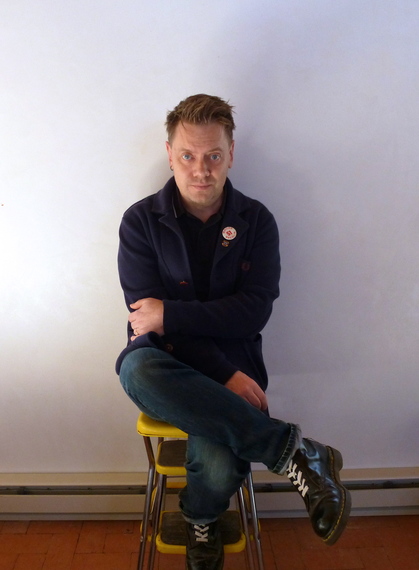Bombshell by James Reich, Softskull 2013; I, Judas by James Reich, Softskull 2011
Though I made my first visit to San Francisco's Tenderloin District about the same time that Valerie Solanas was drafting her famous uber-feminist SCUM Manifesto, we never crossed paths. SCUM, you might recall stood for the Society for Cutting Up Men. And James Reich hadn't yet been born. But Valerie Solanas plainly made a deep impact on the English novelist as he was constructing his blindingly brilliant and horrifyingly comic novel, Bombshell, a road story framed around a fictive lover and devotee of Solanas who has committed herself to cutting up and destroying America's nuclear power industry. Not everyone of course may find it comic. Its comedy rests in the bloody details of the duel between men's greed and the Gods' folly as his self-trained anti-nuke feminist terrorist Cash, born in Chernobyl during the 1986 meltdown, hops in one stolen car or another from New Mexico through Texas, the Deep South, Washington and finally Manhattan in pursuit of the nation's most powerful nuclear oligarch. Along the way Reich's Faulknerian prose rides us through an encyclopedic history of nuclear testing folly from Los Alamos where the story starts through the unguarded French blasts in the Sahara to Cash's own ghastly birth town. Reich's previous novel, I Judas, is a semi-epistolary work in which Jesus's soul brother Judas inhabits myriad other personalities, including Samson, Vincent Van Gogh and George Armstrong Custer.
Why not start with rage--in the language of your characters there is a well of rage that is nearly volcanic, and with I Judas to a lesser but still present degree. That's one, and another is whether you've thought of Bombshell as a Black Comedy--as I, Judas very much seems to be? Is it possible to think about either the story of Judas and Jesus as anything but a comedy, and for that matter, after Indian Point, would not the retributive deities be rolling in malevolent laughter at what their earthlings had invented?
I'm a working class English writer, and living in the United States for the past five years has only amplified my identification with - to borrow from Mark E. Smith - prole art threat. Although I find so much to admire in Christopher Hitchens, his arousal by Thatcher and his general disdain for Look Back In Anger betrays a faint whiff of the Raj and boarding school repression. He related to sex in the way that only a boarding school boy can. Brilliant as he was, there was plenty of the toff in Hitchens that I think endeared him to the American scene. For me, Jimmy Porter in Osborne's play, and his descendent Jimmy Cooper in Quadrophenia are as vital to me as Hamlet. I'm surprised he didn't get it: these are part of the post-Imperial English polemic. They're also very funny. I don't know how you live through Thatcher's Britain without being pissed off. That's where I was politicized: 1984, living on Airstrip One, the C.N.D. and the Greenham Common protests, the anti-apartheid movement, Greenpeace, the miners' strike, and so forth. Bombshell and I, Judas are both comedic in that old Jacques Vaché tradition, and there's some glitter in the gloom. The trajectories of Judas and Jesus are utterly literary. There's something vaudeville about it, so it's no wonder it winds up in rock opera. In different ways, both novels are indictments of archetypal thinking, the dangers of which are, to my mind, black comedy. The things we do to ourselves! We're a suicidal crew with or without deities, but especially with them.
Curious. Do you remember exactly where you were and what your visceral reaction was when you first heard/red about S.C.U.M.? Did your mates in Prole World know about S.C.U.M.?
The Isle of Wight, I think it must have been 1990 because I was obsessed Victor Bockris' biography of Warhol at the time. You probably noticed that the encounter between Cash and the Winters Corporation in Bombshell is modeled after the Solanas' showdown with Warhol. She was strangely fascinating, tragic, witty and deranged. This was while before Mary Harron's film, but she did resurface and receive something of a reappraisal in the riot-grrrl scene. I was really interested in the Warhol Factory scene then, and read whatever I could get my hands on, bought expensive VHS copies of the films. The Isle of Wight was a strange place, very beautiful, picturesque, but fringed with Fawlty Towers style hotels and bed and breakfasts. When I was younger I loved it, the amusement arcades, all that. Later was was more like Every Day Is Like Sunday. In those days it was a tourist economy and much of the island would close down for the winter season. Everyone would be on the dole until the hotels and amusement arcades reopened. It was a popular destination though, and I had my first celebrity sighting there: Roger Moore in a denim suit! Maybe that's why I wrote Bombshell, so that Roger Moore could play Dresner. It all makes sense now.
More pragmatically, for your geographical descriptions of Portland, the SF Tenderloin and Capitol Hill, did you visit these places with your own eyes or Google Eyes (both real and metaphorical)?
The first time I went to San Francisco, in 2003, we were dropped off in the Tenderloin and the bus driver said "don't hang around here too long." I've been to most of the American locations in Bombshell sometimes as part of touring with my band Venus Bogardus. We've toured on both coasts since we moved here - my wife plays bass in the band. The west coast tour we did in 2010 was when we met Ann Bannon, the writer from whom we stole the band name. That was in San Francisco at the premier of the stage version of The Beebo Brinker Chronicles. We played in the lobby of the Brava Theater, for the party after the show. Ann is lovely. I had food poisoning from some dubious hot dog place in LA and she rescued me Tylenol and Tums. She remains the only great writer who has given me drugs.
Were you trundling off to Mass as a kid, or singing "Jesus Loves Me, This I Know, For the Bible Tells Me So?"
No, I can't say that I was. Are you shocked? I followed one or two friends to church when I was a kid, not even a teenager, but even then, I was agnostic at most. That said, Parry's hymn setting of Blake's words in Jerusalem is - believe it or not - something I sing to myself on a regular basis. But Blake's an Englishman, not a Christian.
Somehow it seems to me that either in your working class Brit world, or in performance with the band [Venus Bogardus--Literate Post Punk] or lord knows where, you've trained yourself in some level of particle physics, or at least in the fundamentals of relativity concerning Time and Space.
Are you thinking more about I, Judas or Bombshell? The protagonists of both, Judas and Cash, are alienated by and within their chronologies. The draft title of Bombshell was 'My Lives In The Sex War' but perhaps you're right, these characters are at war with time, or at least their times. But, no, I'm not a physicist. I think anyone who reads a lot of science fiction, as I did, and still do, begins to take a lot of the weird glamor of physics for granted. Novelists probably misunderstand more of this than we think we do, but it's also a consequence of surrealism's recognition of relativity in physics as much as it is a consequence of the Dadaist folding of aesthetic value. As a teenager I read a lot of Michael Moorcock. His fiction is predicated on the multiversal concept of time and space. I think you can see that in I, Judas. Moorcock's Behold The Man really impressed me.
All that detail of nuclear tests and consequences. Do you also know about what the French nuclear monopoly, Areva, the world's largest nuke power company, is doing in the desert of Niger?
The root of Bombshell as an anti-nuclear novel is in my experience of watching the Chernobyl catastrophe as a fourteen year old in 1986. In Britain, this largely unfolded on television, with physicists and meteorologists trying to gauge the scale of the incident, and to predict the transit of the fallout across Europe. The BBC had screened the nuclear war drama Threads (a hybrid of Peter Watkins' The War Game and the American The Day After) two years before, and without exaggeration it is fair to say that Britain did become Orwell's Airstrip One, right on time, and much of the population was acutely aware of the threat of windborne radiation. We were frightened and loaded with nukes for weaponry and power. In terms of American nuclear accidents, as much as Bombshell includes, there are so many more. I've only just become aware of Areva. Africa has really suffered under French nuclear experimentation and exploitation. It's dreadful. Governments and corporations are relentlessly stupid when it comes to the nuclear power. Uranium mining is a live issue for us here in New Mexico. In all cases, I deplore it.
Just been watching an incredible doc on French Tele of William Burroughs. I wonder if they ought not to have spoken to you.
Ha, I don't think I'm on that radar. You're talking about the recent one A Man Within, right? I saw from a friend in Paris that it had been on television. I have to say that it doesn't hold a candle to Howard Brookner's Burroughs: The Movie. Brookner's film is thirty years old, but that's great because it comes from before the perverse revisionist period that we're in now. During the nineties, I wouldn't have hesitated to call Burroughs my favorite writer. He was a great stylist. That's what I loved, and he was essential to restoring the practice of an avant-garde to science fiction. Burroughs' prose is amazingly beautiful, particularly in his elegiac moments in the 1960s novels. But, I fear that there's been a hijacking, and I'm no longer on board.



